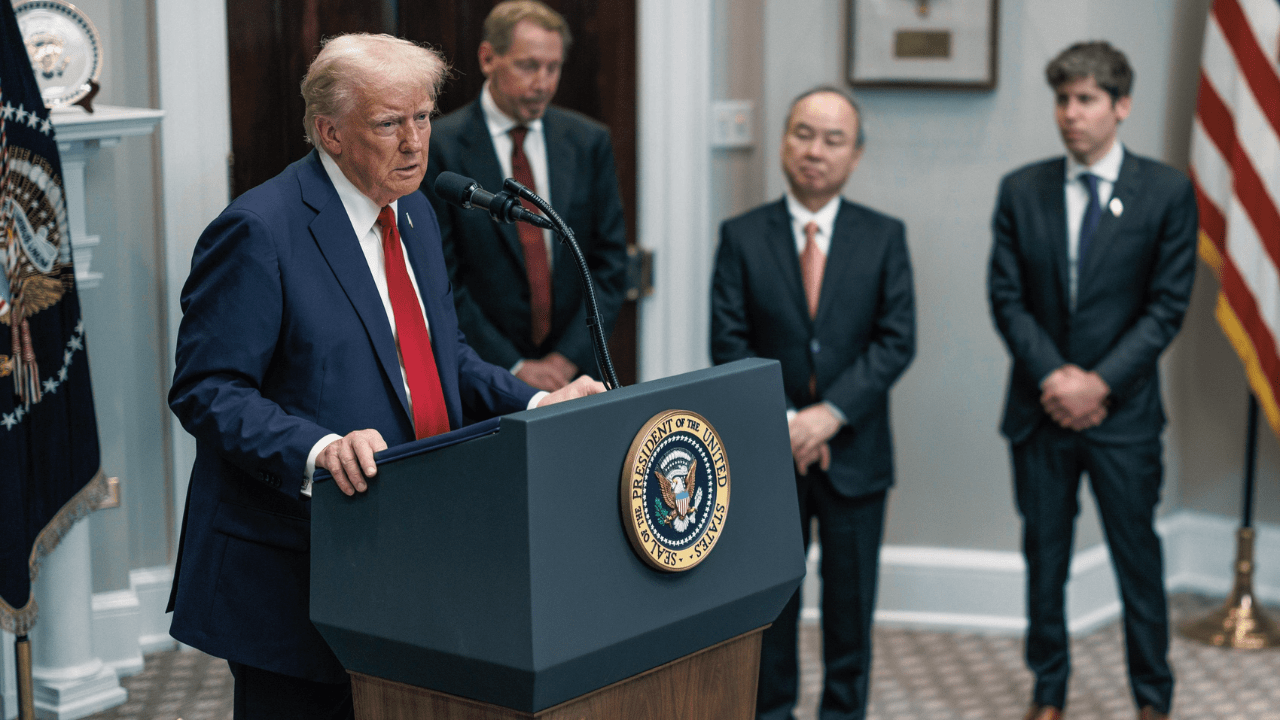President Donald Trump announced Project Stargate, a $500 billion investment in partnership with OpenAI, Oracle, and SoftBank, aimed at strengthening artificial intelligence (AI) infrastructure in the United States. This initiative aims to position the United States as a global leader in AI, with potential implications for international technological competitiveness. For Morocco, this development presents both opportunities for collaboration and challenges regarding technological sovereignty and dependence on foreign technologies. It is crucial for Morocco to evaluate its national AI strategy to take advantage of the opportunities offered while strengthening its internal capabilities.
On January 21, 2025, President Donald Trump announced the launch of Project Stargate, an ambitious initiative aimed at investing $500 billion in artificial intelligence (AI). This project, developed in partnership with tech giants such as OpenAI, Oracle, and SoftBank, aims to build cutting-edge infrastructures and strengthen the United States' position as a global leader in AI. This announcement represents a major turning point in technological geopolitics, marking a decisive step in the global competition for dominance in this key technology. For Morocco, this development represents a strategic opportunity but also raises challenges, particularly in terms of technological sovereignty and local development.
Over the past two decades, artificial intelligence has established itself as an indispensable pillar of global innovation. The United States, China, and the European Union have engaged in a technological race to harness its potential. Each of these actors has developed ambitious national strategies aimed at maximizing the impact of AI on their economy and national security. Morocco, for its part, has recently intensified its efforts in this area by integrating AI into key initiatives such as the digitization of public services, telemedicine, and precision agriculture. However, despite these advancements, the country remains dependent on foreign technologies and investments.
The announcement of the Stargate project by the United States represents a strategic response to China's rise in the field of AI. This project, with its colossal budget, emphasizes research, the development of advanced infrastructures, and data security. The objective is clear: to establish sustainable technological superiority. For Morocco, this initiative opens up interesting prospects, particularly in terms of technology transfer and international collaboration. However, it also highlights the risk of increased dependence on American technologies, an issue that could limit the emergence of a competitive local technological ecosystem.
Developments in the field of artificial intelligence, catalyzed by the Stargate project, involve a multitude of actors and stakeholders, each playing a key role in this global technological dynamic. The United States, through their Stargate project, are mobilizing companies like OpenAI, Oracle, and SoftBank to consolidate their leadership in AI. These actors, with immense financial and technological capabilities, aim to build advanced infrastructures capable of transforming the global technological landscape. Morocco, although not directly involved in the Stargate project, is an indirectly concerned actor regarding the collaboration opportunities and challenges that this project may represent. Moroccan institutions, such as the Ministry of Digital Economy, tech startups, and universities, are all essential stakeholders in adapting to this new era. Finally, other international powers, such as China and the European Union, are closely monitoring the implications of this project, seeking to adjust their own strategies in the global competition for AI.
The Stargate project presents potential advantages but also exposes Morocco to significant risks. The first major risk is technological dependence. Increased collaboration with foreign companies, although advantageous in the short term, could limit Morocco's ability to develop local solutions tailored to its needs. At the same time, the issue of data sovereignty is a central concern. By integrating foreign technologies, Morocco could see its sensitive data exposed, which would compromise its digital security. Moreover, regional inequalities could worsen, as remote or rural areas might not benefit equitably from these technological advancements. Finally, Morocco could face a strategic misalignment, where the objectives of international partners do not always align with local priorities.
To maximize the benefits of the Stargate project while minimizing risks, Morocco must adopt a proactive and balanced approach. It is crucial to strengthen the local ecosystem, particularly by investing in the training of local talents and supporting startups specialized in AI. This would reduce dependence on foreign experts and technologies. Moreover, Morocco can explore strategic partnerships with international companies like OpenAI, but under conditions that guarantee a transfer of skills and technologies. At the same time, it is imperative to develop a solid legislative framework to regulate the use of AI, protect national data, and ensure that imported solutions adhere to high ethical standards. Finally, modernizing digital infrastructures, particularly in rural areas, is essential to democratize access to AI solutions and ensure inclusive development.
The Stargate project reflects the growing importance of artificial intelligence as a global strategic lever. For Morocco, this American initiative represents a unique opportunity to strengthen its technological capabilities and integrate into the global technological ecosystem. However, the country must navigate cautiously to avoid the pitfalls of technological dependence and protect its digital sovereignty. By adopting a proactive, balanced, and strategic approach, Morocco can leverage global developments while strengthening its autonomy. Investing in local talent, establishing balanced partnerships, and developing robust technological infrastructures will be the keys to this success. Ultimately, AI can become a driver of economic and social transformation for Morocco, provided that the country adopts a clear, swift, and ambitious vision.

